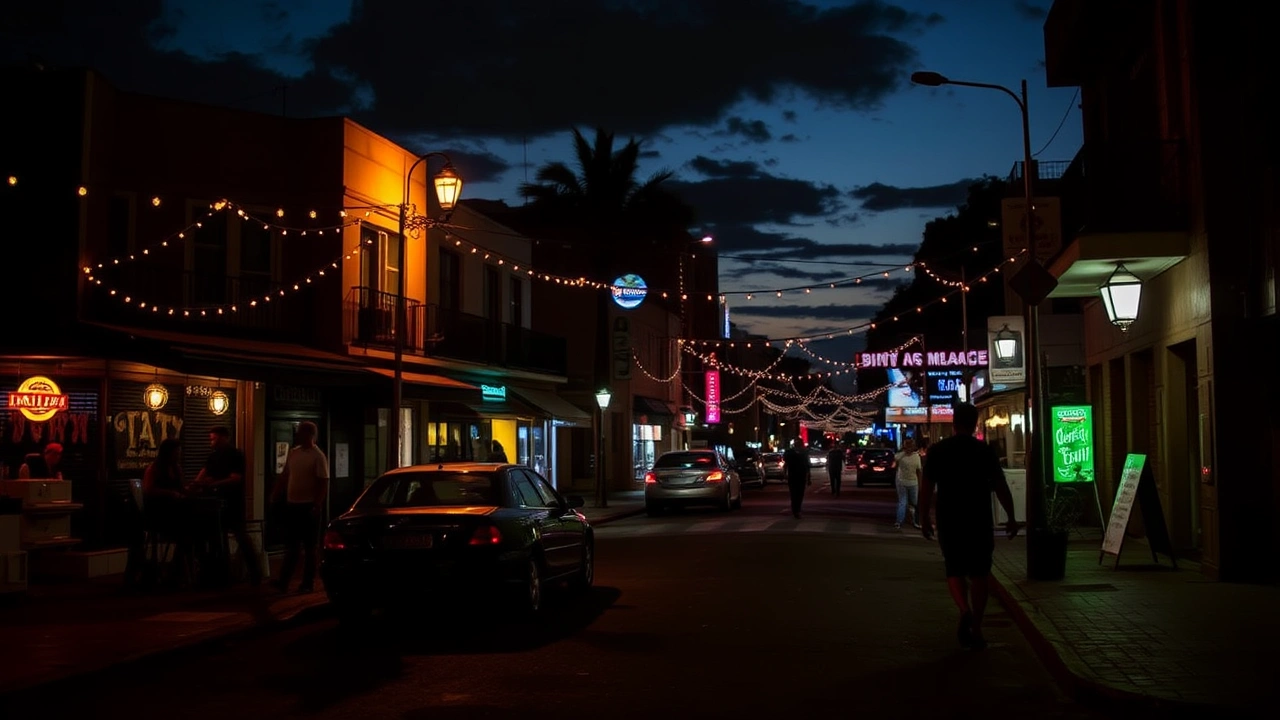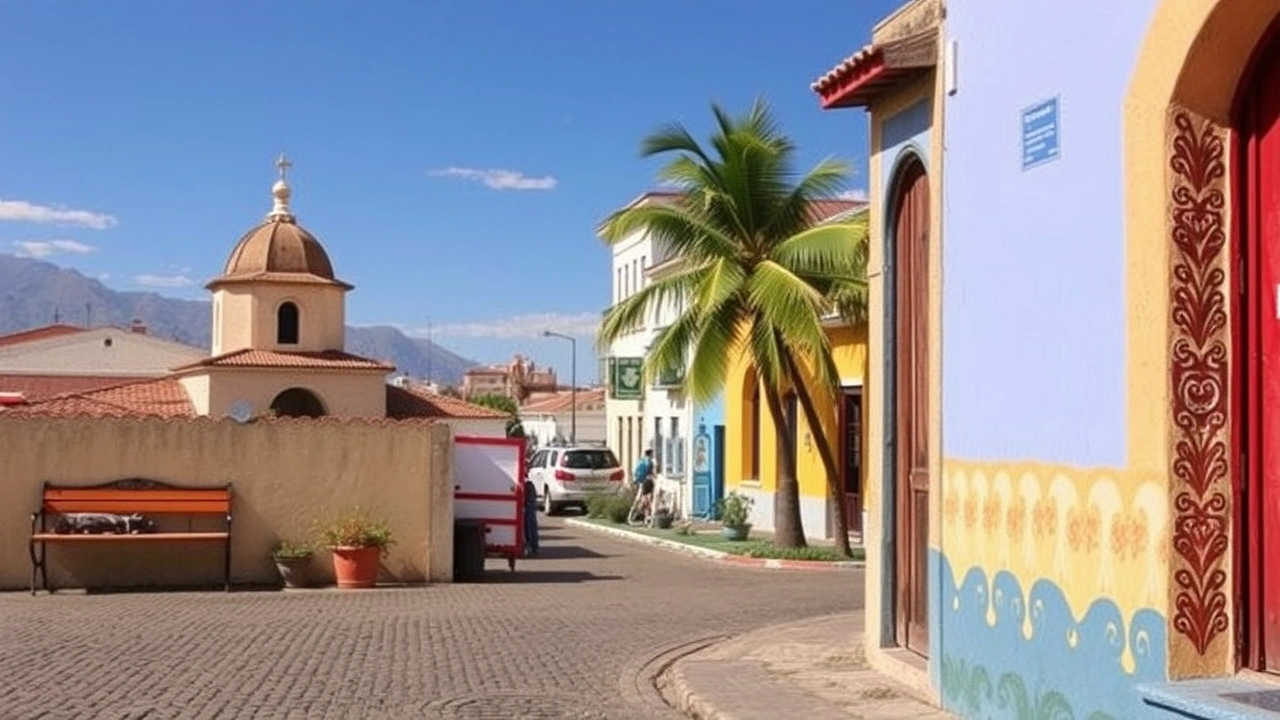
 Published on and written by Cyril Jarnias
Published on and written by Cyril Jarnias
Bali, Indonesia’s Paradise Island
Bali, Indonesia’s paradise island, has long attracted travelers and investors from around the world with its idyllic beaches and rich culture. However, a modern economic phenomenon is beginning to take root there—“dark stores”—transforming the island’s commercial real estate landscape and raising questions about their local impact.
These storage and distribution warehouses, visible only online to consumers, are not only redefining residents’ shopping habits but also influencing the economic and social dynamics of Bali.
As the island continues to grow in popularity among expatriates and tourists, understanding how these discreet entities integrate into the urban fabric becomes essential for anticipating future market developments.
Good to Know:
“Dark stores” are warehouses dedicated to rapid delivery, invisible to traditional customers but essential for e-commerce services.
Expansion of Dark Stores in Bali: A New Real Estate Trend
Dark stores are warehouses closed to the public, primarily used for preparing and quickly delivering products ordered online. These structures are often located in city centers, close to customers, enabling ultra-fast deliveries, typically in under 15 minutes. Although the concept is well-established in some countries, there is no specific information about their growing popularity in Bali. However, if dark stores were to establish themselves in Bali, several elements could be observed:
Operations and Advantages
- Operations: Dark stores function as mini-distribution centers, storing a limited range of products tailored to local demand. They optimize the packaging process to reduce delivery times.
- Advantages: They offer high delivery speed, thereby improving the customer experience. They require little space and can be set up quickly, reducing operating costs.
Impact on the Real Estate Market
The expansion of dark stores could have several impacts on the local real estate market:
| Aspect | Potential Impact |
|---|---|
| Property Prices | Increase in prices for properties near urban areas due to higher demand for strategic spaces. |
| Availability | Reduction in availability of traditional commercial properties, as some may be converted into dark stores. |
Implications for the Local Community
- Economic: Dark stores could create jobs in the logistics sector but reduce opportunities in traditional retail.
- Social: They could alter shopping habits and influence the social dynamics of neighborhoods, with fewer physical interactions between consumers and traditional stores.
Reactions from Local Authorities
Authorities could have varied reactions, ranging from regulating locations to prevent urban area saturation to promoting dark stores as a means to stimulate the local economy.
Opportunities and Challenges for Investors
- Opportunities:
- Delivery Speed: Dark stores offer unparalleled delivery speed, which can attract investors looking to enhance the customer experience.
- Flexibility: They can be quickly installed in existing spaces, reducing initial costs.
- Challenges:
- Regulation: Authorities might impose strict regulations on locations and operations.
- Technological Adaptation: Investors should be prepared to invest in automation solutions to optimize order preparation processes.
Good to Know:
Dark stores, these logistics warehouses used for preparing online orders reserved for delivery, are experiencing rapid growth in Bali, transforming the local real estate landscape. Their emergence is mainly due to the rise of e-commerce, meeting the growing consumer demand for fast deliveries. In Bali, this trend has significantly altered the use of commercial properties, increasing prices for available spaces and reducing the number of traditional stores. Although these dark stores stimulate the economy by creating jobs and attracting investments, they also raise concerns among local residents about the impact on the community and urban environment. Local authorities face the challenge of regulating this expansion while ensuring balanced development. For investors, these structures offer lucrative opportunities but also present challenges in terms of regulation and adaptation to local needs, requiring a strategic approach to make the most of this growing phenomenon.
Last-Mile Logistics Challenges in Bali
The main logistical obstacles encountered during last-mile delivery in Bali are closely linked to limited road infrastructure and chronic traffic congestion, two factors that significantly complicate the efficiency of urban deliveries.
Major Obstacles Encountered:
- Insufficient road infrastructure, with narrow or poorly maintained roads in some urban and suburban areas
- Frequent congestion due to heavy tourist and local traffic, extending delivery times
- Difficulty optimizing routes due to the unpredictability of Balinese traffic
- Lack of dedicated parking spaces for delivery vehicles, often forcing delivery personnel to cover part of the route on foot or by two-wheelers
| Obstacles | Consequences on Delivery |
|---|---|
| Limited roads | Repeated delays |
| Dense traffic | Longer travel times |
| Lack of parking | Decreased efficiency |
These challenges directly affect the efficiency of dark stores, these urban warehouses specialized in rapid processing of e-commerce orders. Dark stores depend on ultra-responsive logistics execution: every minute lost in traffic or searching for parking impacts their promise of speed. Inefficient last-mile management leads to:
- Significant increase in operational costs (fuel, personnel)
- Decrease in customer satisfaction rates due to recurring delays
- Increased complexity in managing multiple orders simultaneously without advanced technological systems
Concrete Examples of Initiatives Implemented:
Increased use of electric scooters or motorcycles to navigate dense traffic easily and access narrow alleys inaccessible by vans
Gradual deployment of mobile applications integrating dynamic route optimization based on real-time traffic using smart GPS and predictive algorithms
Occasional experimentation with micro-mobility (cargo bikes) to further reduce environmental impact while accelerating the “last meter” passage
Technological Solutions Adopted:
Non-exhaustive list:
- Advanced automated order management systems (WMS) coupled with real-time GPS tracking to quickly adapt routes based on local road conditions
- Collaborative platforms enabling better sharing among different logistics operators to avoid multiple vehicles unnecessarily serving the same area
The impact on commercial real estate is notable. Faced with these logistical constraints:
- Actors now primarily seek to locate their dark stores as close as possible to densely populated residential areas to drastically reduce the distance traveled.
- There is also a growing development of hybrid spaces: mini-hubs shared among multiple brands/logisticians where preparation and rapid shipping are centralized.
- This evolution thus creates new real estate demand: compact but highly accessible premises from major secondary routes rather than in the saturated city center itself.
In summary, the major challenge lies in constant adaptation to Balinese physical realities; every innovation—whether technological or organizational—therefore primarily aims to bypass urban congestion and structural limitations so that dark stores can honor their fundamental promise: to deliver quickly despite everything.
Good to Know:
Last-mile delivery in Bali presents notable logistical challenges due to limited road infrastructure and frequent traffic congestion, slowing down the distribution process of dark stores, these urban warehouses dedicated to fast online orders. To overcome these obstacles, some players use adapted vehicles such as electric scooters, capable of navigating narrow and crowded streets more easily. Additionally, advanced geolocation technologies help optimize delivery routes. These logistical constraints also impact commercial real estate, creating new opportunities for strategically located storage and delivery spaces to reduce delays. Consequently, there is growing interest in developing micro-warehouses and delivery hubs that would better integrate with Bali’s unique urban dynamics.
Booming E-commerce Investment in Bali
The explosive growth of e-commerce in Bali is part of the national Indonesian dynamic, driven by accelerated urbanization, a young population, and the digitalization of consumption patterns. Online sales are experiencing remarkable growth, with a projected national market exceeding $73 billion by 2029 and an average annual growth rate above 12%. In Bali, this trend translates into massive adoption of mobile and social commerce, particularly via platforms like Tokopedia, Shopee, or TikTok Shop.
Government measures play a key role in this development. The Indonesian state has implemented policies to protect local SMEs against aggressive international competition (notably by blocking foreign applications like Temu), while offering tax incentives to foreign investors supporting Bali’s digital economy. These measures promote:
- Creation of skilled jobs in the logistics and digital sectors
- Integration of local micro-enterprises within e-commerce chains
- Reduced taxation for certain technological or real estate investments related to e-commerce
The rapid emergence of “dark stores”—urban warehouses without direct customer access dedicated exclusively to online orders—is disrupting Bali’s real estate market, especially in urban areas like Denpasar or Kuta. Their establishment creates increased demand for:
| Effect on Real Estate | Description |
|---|---|
| Urban land valuation | Rise in price per square meter near logistic axes |
| Functional transformation | Conversion of classic commercial premises |
| Pressure on rental supply | Fewer spaces available for stores |
These installations accelerate urban delivery (express delivery under 2 hours) but also intensify certain land tensions.
Major platforms closely collaborate with local actors to adapt their offerings to Balinese cultural and economic specificities:
- Partnerships between Tokopedia/TikTok Shop and local artisans to promote “buy local”
- Development of adapted social features (interactive live shopping)
- Advanced integration of mobile payments via GoPay/OVO/ShopeePay
Economic & Social Impact:
- Direct creation of skilled jobs (urban logistics, digital management)
- Significant increase in average income among some digitized merchants/artisans
- Facilitated access to international markets thanks to visibility offered by platforms
Environmental Effects:
- Increased pressure on urban infrastructure due to rapid multiplication of express deliveries
- Emerging incentives towards greener logistics (electric vehicles, recyclable packaging)
In summary, e-commerce investment is profoundly transforming Bali: it stimulates its local economy while generating new real estate and environmental challenges that public authorities and companies are now striving to collectively manage.
Good to Know:
In Bali, the e-commerce sector is experiencing rapid growth, notably due to tax incentives offered by the Indonesian government, thereby attracting significant international investment. “Dark stores,” these invisible yet crucial urban warehouses for modern logistics, are transforming the real estate market in urban areas, increasing demand for suitable commercial premises. These installations allow major e-commerce platforms to reduce delivery times while collaborating with local actors to meet the specificities of the island market. This dynamic stimulates the local economy, creating jobs and offering new opportunities for Balinese businesses, although it also raises questions regarding environmental and social impact in a fragile island setting.
Impacts of Dark Stores on Bali’s Real Estate Market
The rise of dark stores in Bali, following the rapid growth of e-commerce and quick commerce (delivery within minutes), is reshaping demand in the commercial real estate market, particularly in dense urban areas. Dark stores appear as commercial spaces closed to the public, exclusively dedicated to preparing and quickly shipping online orders. Their establishment favors central neighborhoods or those easily accessible from main routes to optimize delivery speed.
Effects on Rents and Real Estate Occupancy:
- Selective rent increases for suitable properties (former stores, warehouses near downtown) becoming strategic for urban logistics.
- Moderate valuation of previously underutilized or vacant spaces in some industrial peripheries.
- Increased risk of vacancy for traditional stores in sectors massively converted into private logistics centers.
| Area | Impact on Rents | Occupancy |
|---|---|---|
| Central Urban | Strong increase | Increased occupancy by dark stores; decline in physical stores |
| Periphery/Industrial | Moderate increase | Optimization of vacant spaces; diversification of uses |
Discussions Between Real Estate Developers and Dark Store Managers:
- Negotiations around flexible leases allowing future reversibility to classic or logistic use depending on market evolution.
- Contracts sometimes including clauses on technical adaptation of premises: facilitated access, modular surfaces, enhanced security.
- Growing possibilities of direct acquisition by some major operators wishing to secure their urban logistics network.
Advantages/Disadvantages for Real Estate Investors:
Advantages
- New solvent tenant category from international and local e-commerce
- Potential for accelerated valuation in some strategic neighborhoods
- High occupancy rate when the property is well located
Disadvantages
- Dependence on a specific sector whose economic model could evolve rapidly
- Possible loss of local commercial attractiveness if too numerous: decreased foot traffic/physical commerce
- Potential regulatory complexity regarding mixed/logistic uses
Urban Structure & Future Opportunities:
The lasting establishment of dark stores could induce a partial mutation of urban fabrics in Bali: gradual reduction of storefronts open to the public in favor of discreet mini-logistic hubs. This trend favors land optimization but also raises questions about traditional commercial balance. For local and international investors, it nevertheless represents a new strategic window: patrimonial diversification via acquisition/active management of these “hybrid premises,” while remaining attentive to municipal policies likely either to regulate their development or—conversely—to actively support their expansion to revitalize certain commercial wastelands.
Key Takeaway: The massive emergence of dark stores is already structurally transforming Bali’s real estate market: localized upward pressure on some commercial rents, renewed attractiveness for spaces once neglected… but also new challenges related to coexistence with an urban fabric still largely oriented towards a physical and tourist economy.
Good to Know:
The rise of dark stores in Bali has modified the urban real estate landscape, amplifying demand for commercial spaces in central areas, which has caused a notable increase in rents and a reduction in the availability of traditional real estate properties. Negotiations between real estate developers and dark store managers often reveal ease in short-term lease agreements, although market saturation is beginning to raise questions about long-term viability. For investors, particularly international ones, the appeal lies in high potential profitability, but they must also navigate between quick profits and risks of rental instability. This dynamic could gradually restructure Bali’s urban space, while opening interesting opportunities for the development of commercial hubs multiplying the tourist attractiveness of certain areas.
Disclaimer: The information provided on this website is for informational purposes only and does not constitute financial, legal, or professional advice. We encourage you to consult qualified experts before making any investment, real estate, or expatriation decisions. Although we strive to maintain up-to-date and accurate information, we do not guarantee the completeness, accuracy, or timeliness of the proposed content. As investment and expatriation involve risks, we disclaim any liability for potential losses or damages arising from the use of this site. Your use of this site confirms your acceptance of these terms and your understanding of the associated risks.















































